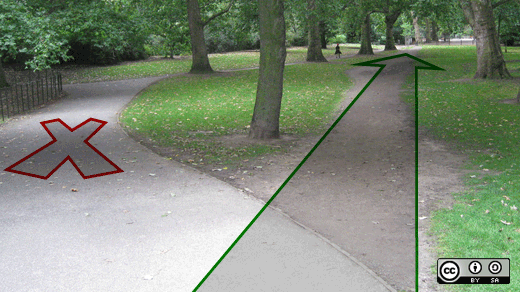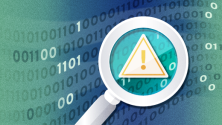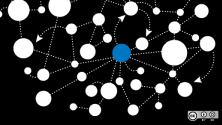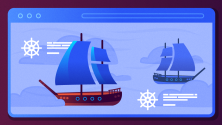Learning is an endless journey, not a fixed destination. And sometimes, learning can be a tough climb up a challenging mountain. It helps to have a sherpa, a mentor, to praise us when we reach new heights and provide a caring push when we are stuck in the mud. Mentoring is common in the classroom—fostering intellectual growth and development is at the heart of great teaching. But what mentoring lessons apply to open source communities?
Jenn Greenaway, early education specialist and self-described "brain development geek" at Conejo Valley Unified School District, has uncovered deep connections between the practice of intentional mentoring and the success of open source communities.
At SCaLE 14x in Pasadena, California, Greenaway will share her mentoring expertise in a talk titled Dent the universe: Mentoring in open source. As a fellow educator, when I read her talk summary I just had to reach out to learn more. She spoke with me prior to SCaLE and offered valuable insight into what open source communities can learn from the art of mentoring and teaching.

Tell us about yourself and your role at Conejo Valley Unified School District.
I'm an Early Care Teacher for the Conejo Valley Unified SD. For six and a half years I have been the leader of their program for infants and toddlers. We offer a high-quality developmental program to children between the ages of six weeks and 18 months. Each day I am in a classroom with eight infants and toddlers, my two assistants, and our college and university interns. There is truly never a dull moment.
I studied child development at Moorpark College and the University of La Verne, with an emphasis on teaching children ages 0-8. I'm a brain development geek—learning about learning is my happy place. I began my career working with elementary school children, then taught preschool children, and now I am focused on the very foundation of growth and development. It's been an unusual path, but I absolutely love the work that I'm able to do with children and families, and it's a privilege to be able to observe the amount of learning that happens in front of me every day. I have so much respect for the amazing abilities of the youngest children.
Elementary education and open source might sound like an unusual pairing. How are the two worlds linked?
To me it seems a natural pairing because they are two things I am passionate about and things that I do and use every single day. So many of the principles of open source correlate with the positive outcomes most desired for children: collaboration, participation, and transparency (honesty, integrity, openness). For children who are interested in how things work, open source software can give them that behind-the-scenes peek. I love teaching children about open source because there are so many ways they can get their hands dirty and get involved in communities and meet people who share their particular interests. There are many projects that were developed with children in mind, like the great work done by Sugar Labs.
In the past I was involved in supporting the first years of The Next Generation track at SCaLE, which is run by youths in the open source community—it is a day when they give presentations on their projects and passions. It's an amazing event to witness because you can see so much excitement and enthusiasm for serious learning. Each year at that event, my enthusiasm for pairing open source and education is reborn. I urge all parents and educators to poke their heads into the room! This year it will be happening January 23 at the Pasadena Convention Center.
It has been my experience that members of the open source community are experts at solving problems. My friends in open source are stellar examples of the growth mindset (the belief that our abilities are not fixed, but develop over time with practice and care), which I appreciate as a brain development geek. They remind me of the things that are most important for children to learn: persistence, creativity, and resilience. I think children and open source are a natural pairing because young children never, ever stop solving problems and figuring things out for themselves, which is the same behavior that I observe in a lot of developers and engineers. Introducing children to open source seems to me to be one of the best ways to foster the active, intelligent use of the technologies that have overtaken their lives.
On a more personal note, if you're wondering how a brain development geek became an open source geek, I can tell you that it was gradual. I was a Linux user before I was an educator. I started using Linux on my desktop computer in the late '90s when I was in high school. I was strictly an end user, and it was several years before I switched entirely to a Linux-only desktop. My husband is one of the founders of SCaLE, so each year it seems that as the event grows, so too does my involvement in the wider open source community. As an educator, I love the spirit of open source—the sharing and problem solving. I'm continually analyzing the overlaps between my professional world and the open source world. I encourage my fellow educators to get on the open source bandwagon. It's good for your brain!
Why is mentoring important for open source communities?
I think mentoring is important in every field, but especially when you're entering a community of any kind. A mentor can support you in making the best contribution possible and can help you to navigate the proper communication channels and understand the culture. The best definition of a mentor is "not a teacher, but a guide." Anyone who has spent time in open source communities will understand the value of having a trusted guide. Mentoring is also a natural fit for open source communities because it is another way to collaborate and arrive at the best end result together.
What triggered your interest in mentoring?
When I was in college I took a class on mentoring that sparked my interest in the subject. More recently, I had the opportunity to join the Mentor Teacher Program in the state of California, which allows me to serve as a guide to college and university students who are currently preparing to begin working with children and families as teachers or specialists. Each semester I'm assigned to mentor a number of these students. The process has been so beneficial to me as a teacher and caregiver and has prompted me to learn more about mentoring in general. It's a subject that I get excited about because it's been such a positive experience in my own life and I've seen what good mentoring can do for others as well. In the open source community there has been a long tradition of people figuring things out as they go along. While that has its place, mentoring should be a necessary component when it comes to planning for the future as the communities and projects become stable environments.
What exactly is meant by intentional mentoring? Isn't all mentoring intentional?
Not really! When you talk to people about mentoring, you learn that there is a lot of accidental mentoring happening in the world. When you explain what mentoring looks like and feels like, many people will relate that they had someone who was a mentor to them at one time or another, but that they didn't see it that way at the time or give it much thought at all. Intentional mentoring is a formalized relationship with agreements, goals, and accountability on both sides. The mentor knows and carefully considers their role, and the mentee does the same. Every type of mentoring can be of benefit to both parties, but intentional mentoring is structured and specific.
What classroom teaching and learning strategies apply to mentoring in open source communities?
One of the keys in successful teaching and learning is observation. This is true in mentoring as well. Mentees observe their mentors as a kind of role model, learning from them by example. Mentors observe their mentees to identify their strengths and areas in need of improvement. In open source communities, newcomers can benefit from guidance in navigating the culture (as each community is so unique) and in finding their own sweet spot. Communication is another key. Learning to communicate effectively and appropriately is a skill that is essential, but needs to be understood as fluid. Different communities will communicate in different ways, and you will most likely learn the "right way" most efficiently with a little support.
Without revealing too much of your talk, what actionable tips can you offer for new mentors?
Write up an agreement with your mentee. This can be as formal or informal as you both like. It's not essential that it be signed, dated, and witnessed by a third party, but it's essential that it's read, reviewed, and agreed upon. This agreement is going to outline the responsibilities you're undertaking with one another. For example, what will your time commitment be? Be realistic! What are the mentees goals? These should be clearly defined and understood by both parties. What parameters will you set for your communication? Is it okay to call you at home? Do you prefer email? Having some ground rules will make things much easier on both sides.
Tell us about a great mentor that influenced your career. What did they teach you?
I had a great mentor when I first began teaching preschool. She taught me so much about the community that I was serving at the time and about how to be a leader. I was in a situation where I was beginning to question my instincts and she was there at just the right time to support and affirm my practices. She pushed me to be better at my job because somehow she was able to see strengths in me that I hadn't recognized in myself. We haven't worked together for many years, but I still think of her each time I face a challenge in the workplace.
Can you offer a few examples of high-quality open source mentoring programs? Which organizations have best practices for the open source community to emulate?
The Apache Software Foundation's Mentor Programme is one that others could learn from. In their own words, "The mentoring programme is not here to teach you to write documentation or code. It is here to help you understand how to make a valuable contribution to an Apache project. You can expect to be guided through our contribution processes." Their application procedure is laid out step by step on their website so that potential mentees know where to go and what to do. In connection with Google Summer of Code, they also offer some tips on how to be a successful mentor. I have been impressed by the extent to which they have formalized and documented their program.
How might one evaluate the effectiveness of a mentoring program?
Start by knowing the objectives going in. There should be a clearly defined answer to the question: "Why does this program exist?" From there, you'll want to look at the outcomes. Are the members satisfied? At the end of the mentoring relationship (if an end date is a part of the program), both mentors and mentees should reflect on what has transpired, looking back on their goals and whether or not those goals were met, and how. What could they have done without? As these reflections are documented, evaluation of program success will be relatively easy to track. Over time, it will be possible to evaluate things like membership (is it growing?) and whether the set objectives are being met or may need tweaking. For example, a program may begin with the idea that an objective is to retain talent, but may evolve to an objective of being more focused on creating an inclusive culture.
Mentoring is a very personal relationship, and can be difficult to sustain from a distance. How might distributed teams overcome the challenge of remote mentoring?
I mentioned how crucial communication is in the mentoring relationship. Fortunately, there are many ways to communicate. Some mentors and mentees have never met face to face, but have had very successful partnerships. It's important to determine the best means of communication for each task. Giving lengthy feedback on a specific item may be best done via email, while having a brainstorming session could be effective via a Hangout or IRC. Most important, I think, is the time commitment. Mentors must be dedicated to their mentee—to getting to know them, to understanding them, and to supporting their goals. Once they've made that commitment and invest themselves in it, they'll find that the means of communication make little difference because the value is in what's being shared.
For those who can't attend your talk, what is one message you would like to send?
Mentoring is awesome!
Being mentored is great, and I wish for everyone who wants a mentor to be able to connect with the right one at the time. It's my hope that the experience of being on the receiving end of mentoring brings more people to a leadership role. Being a mentor is incredibly rewarding, and I guarantee that in the process you'll learn much more than you expect to. Everyone has something to learn and everyone has something to share.
What open source software tools do you regularly use for teaching and learning?
I actually work in a screen-free environment! Because of the age groups that I'm working with, my teaching time is free of computers, tablets, phones, etc. It's intentionally all old-fashioned hands-on, brain-building stuff like blocks. I even take all my notes and do a large portion of my documentation by hand. With pens! On paper! For older children, I love Sugar and of course Scratch. The two software tools that I open most often for my own use are LibreOffice and GIMP.







1 Comment